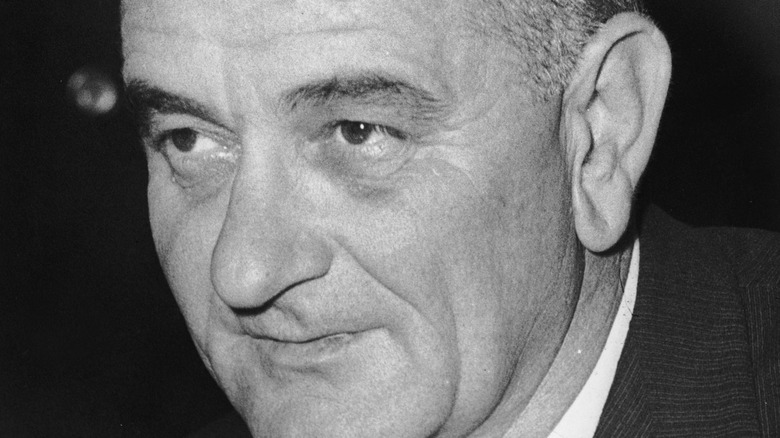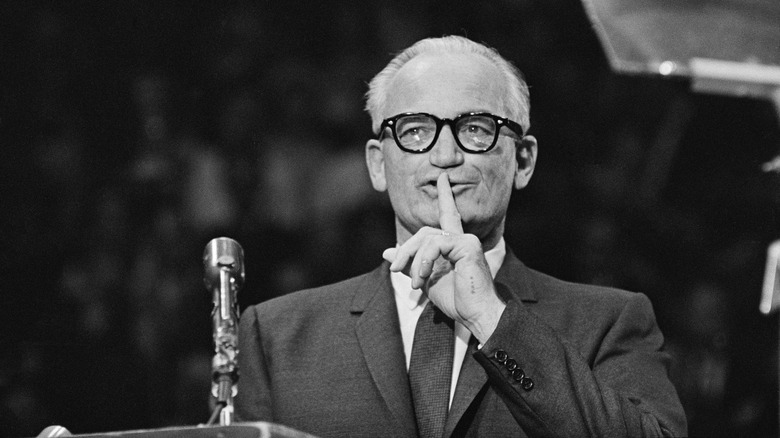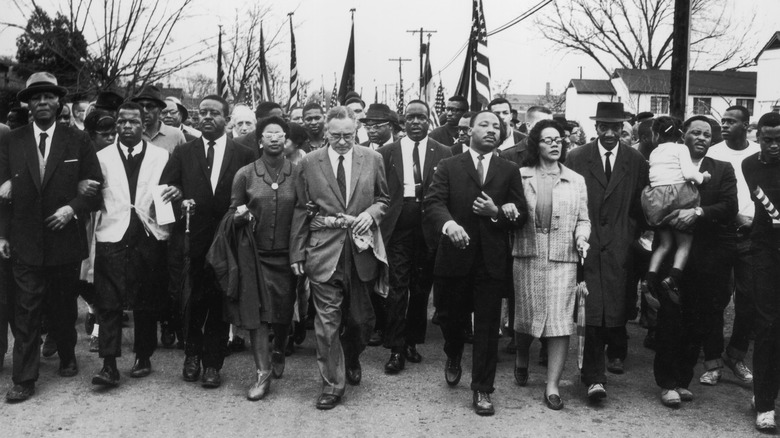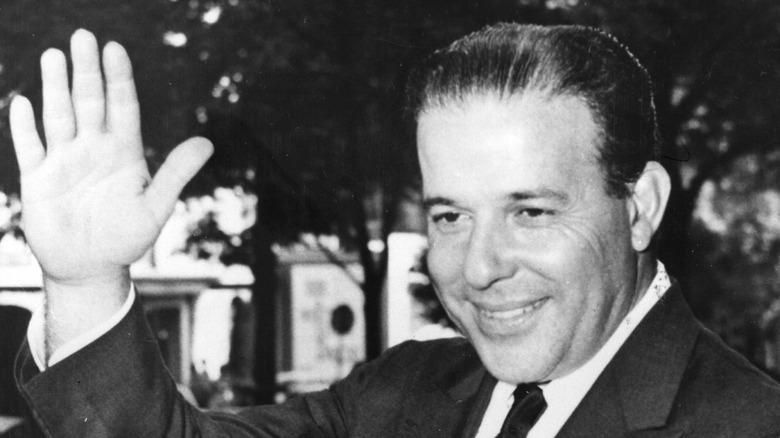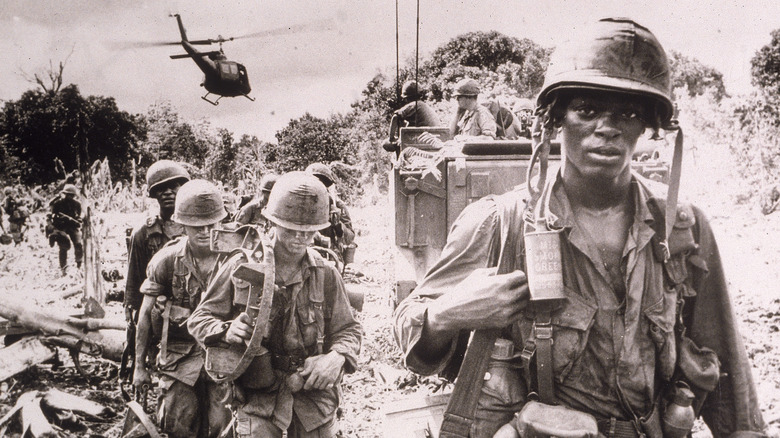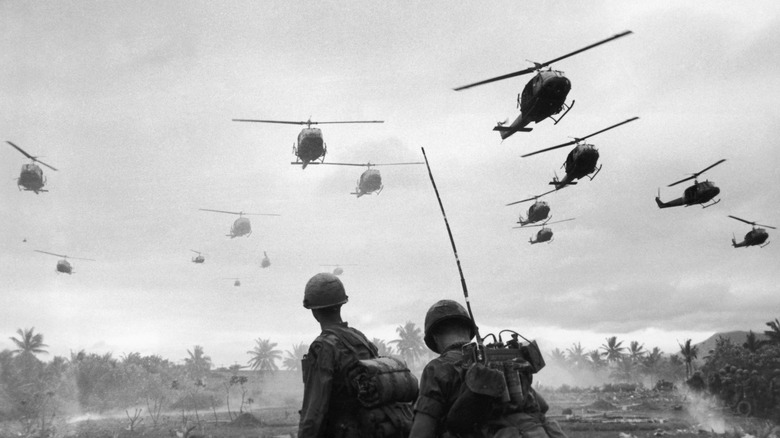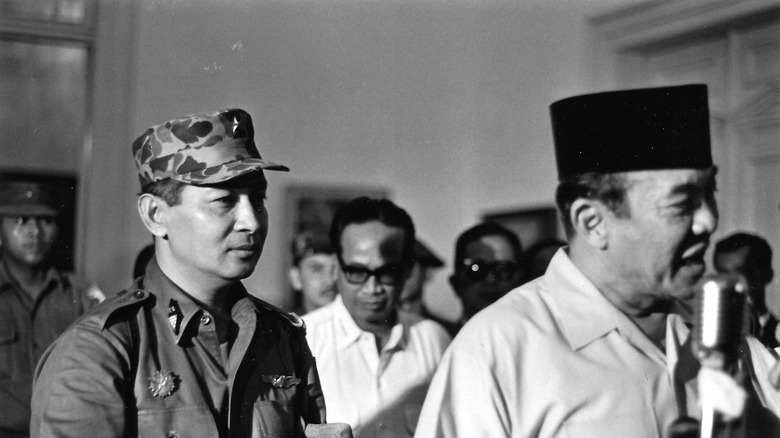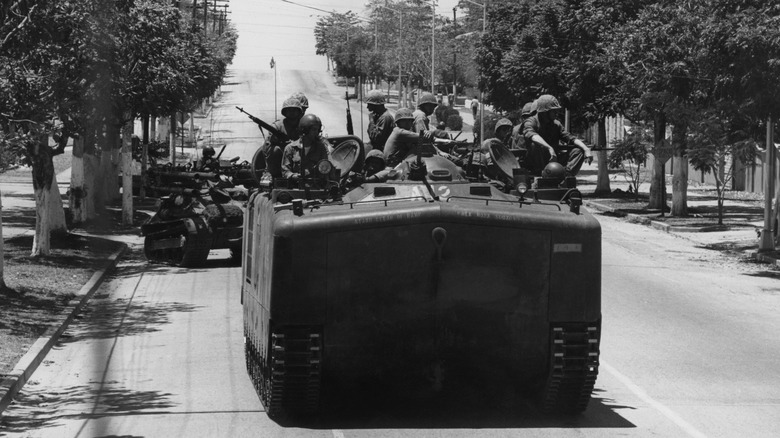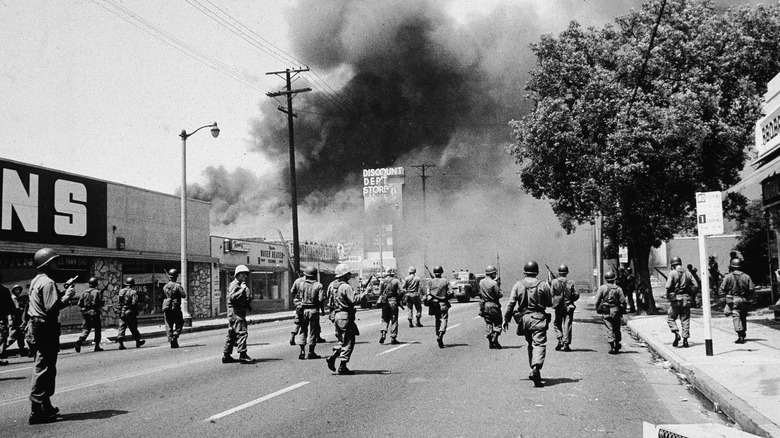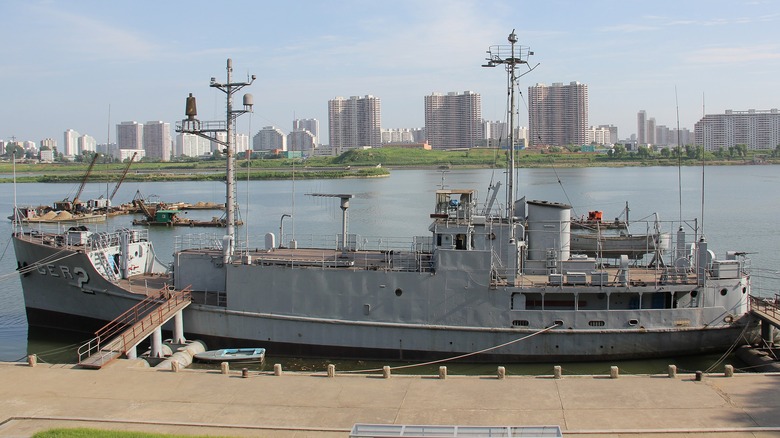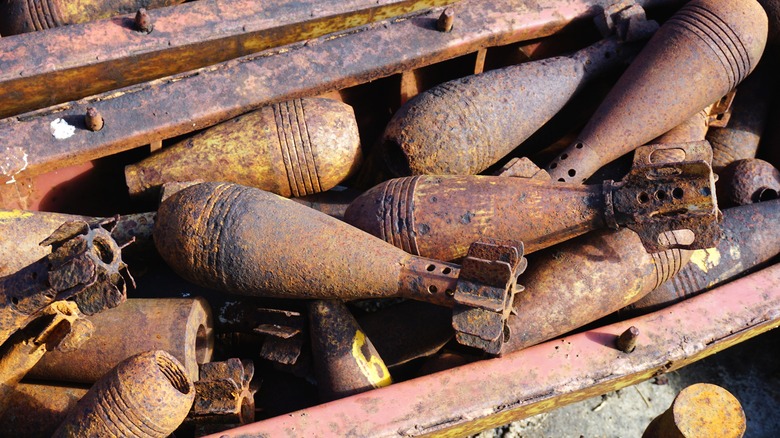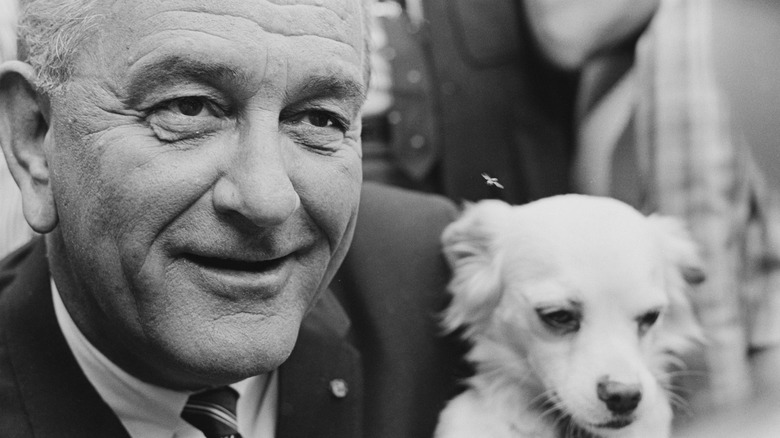Questionable Things About Lyndon B. Johnson's Presidency
Lyndon B. Johnson is often praised for being one of the better presidents of the United States. However, while LBJ did some cool stuff, such as pushing through civil rights legislation and fighting poverty, he also took part in some regrettable espionage abroad, presided over the worst of the Vietnam War, and engaged in a domestic spying campaign that would make Richard Nixon blush.
While he was president, Johnson's reputation at home was nearly destroyed by his adventures abroad, and he made some bellicose decisions that even his nearest and dearest disagreed with (via CNN). Cold War paranoia often got the best of him — and today, he should be counted among the worst interventionist presidents. In the shadows, his government committed atrocious war crimes and supported the war crimes of others.
On a personal level, Johnson was also just pretty hard to deal with — and he remains a strong candidate for the rudest president of all time, despite some stiff competition.
Johnson spied on his political opponent
Just like Richard Nixon, Lyndon B. Johnson decided to get an edge on his political opponent in the election of 1964 by using wiretaps to spy on the opposition. Unlike Nixon — he got away with it.
Having become president following John F. Kennedy's death in 1963, Johnson had Secret Service agents at his disposal — and he used them illegally. Over the years, multiple people have confessed to helping Johnson win the election via illegal means, including the former director of the CIA (via WSJ). We now know that the CIA planted an agent within Republican Barry Goldwater's team, and the FBI listened to his conversations via wiretaps. Even his plane was bugged.
In all likelihood, Johnson was bound to win anyway, but spying also gave him an edge. For one, Johnson was able to read Goldwater's stolen speeches before he could deliver them (via Politico). Goldwater later told the Washington Post (via Politico) that he knew he had no chance against Johnson and was well aware of the spying. It was once written off as paranoia, but it turned out to be true. Yet despite all this, it is Watergate — not "Goldwatergate" — that you remember. And in the end, Johnson won by a landslide.
He spied on everybody else as well
Lyndon B. Johnson resorted to spying many times throughout his career. Jumpy about swelling protests leading up to his electoral campaign in '64, he asked the FBI to bug Martin Luther King's offices and the offices of the MFDP (via U.S. National Archives). According to an exposé by The New York Times from the 1970s, he is also believed to have spied on his own party. Desperate to receive the Democratic nomination for the presidency, he used wiretaps to keep an eye on his colleagues at the Democratic national convention.
Johnson's love of wiretaps in general is now infamous. Johnson, and Richard Nixon after him, oversaw a period in which CIA spying on American citizens reached an all-time high (via History). Although the CIA is not supposed to spy on Americans at home, under LBJ's administration they began "Operation CHAOS," a domestic surveillance campaign with an enormous reach. Among their targets were anti-war protestors who objected to American activities in Vietnam, civil rights groups, and the Black Panthers.
He helped to overthrow the president of Brazil
Brazilian President João Goulart was a leftist with close ties to labor unions in Brazil (via Oxford Reference). Although he was not particularly radical, the U.S. was highly suspicious of the left-leaning politician who took power at the height of the Cold War.
Plans to get rid of Goulart were formulated by John F. Kennedy's advisors in the early '60s, and Lyndon B. Johnson okayed the plans when he took over as president in 1963 (via Pereira, Journal of Latin American Studies, 2016). The fact that Goulart had been democratically elected by his own people was immaterial to the Johnson administration, who backed a military takeover in March 1964. Operation Brother Sam sent U.S. Seals into the fray as support in April, and weapons were delivered via an unmarked submarine to disguise the U.S.'s involvement (via the National Security Archives). Johnson's role in the coup was at one time just a mere suspicion, but declassified documents and audiotapes released since the 1960s have shown he was totally on board with the clandestine operation — he recommended that the U.S. do whatever was necessary to see it succeed. This included sending American ships to the coast, and arming paramilitary groups in the area.
Although many people involved in the coup had high hopes that an election would follow the upheaval, in reality, 21 years of brutal military rule was on the cards. The consequences of the regime change were horrific for the Brazilian people — culminating in the so-called "Years of Lead," during which many Brazilians were tortured or shot.
He escalated the war in Vietnam
In 1964, Lyndon B. Johnson massively escalated the scale of U.S. involvement in Vietnam (via History). Johnson took the decision despite strong opposition from his friends, his advisors, and even the vice president (via The Conversation). Opponents of the war correctly foresaw that the U.S. military would be trapped in an endless conflict that achieved very little — and required way too many bodies to sustain.
The number of American soldiers in Vietnam rose and rose until it hit half a million people. As troop numbers increased, so did unrest at home. Anti-war protests came to '60s America, culminating in massive rallies such as the one conducted outside the Pentagon in 1967, which attracted 35,000 demonstrators. In the long run, upset over Vietnam really did help to kill LBJ's popularity, despite all the good that he did elsewhere. Not least because he repeatedly lied to the American public about the progress they were making (via The New York Times). Johnson's infamous "credibility gap" over Vietnam became legendary.
The U.S. stayed in Vietnam until 1973, when they pulled out under the Nixon administration. Over 58,000 Americans died, along with millions of Vietnamese people. Countless others were psychologically scarred for life. Worst of all, in the end, it was all for nothing: The socialist DRV took complete control over the state by 1976, and LBJ's communist containment policy proved to be a failure. The war is a black mark against his legacy even today.
His administration committed atrocities in Vietnam
Vietnam was not just a military blunder — it was a humanitarian catastrophe. The way Lyndon B. Johnson's government chose to fight the war was grotesque: American soldiers used Agent Orange and napalm to defeat their enemies, resulting in many agonizing deaths and horrific injuries (via Thoughtco). In 1965, Johnson also ordered Operation Rolling Thunder — an attempt to bomb the Viet Cong out of existence (via History). While these methods devastated the country, they did not win the war. The U.S. could not defeat the guerrillas who regularly hid underground and reappeared to repair the damage they'd done.
In 1967, an international tribunal found the U.S. guilty of war crimes in Vietnam, Cambodia, and Laos (via The New York Times). They amassed evidence that the U.S. had bombed civilian targets, used torture, and employed sadistic weaponry.
Less than one year after the tribunal, in 1968, the My Lai Massacre occurred, perhaps the worst atrocity that we know of from the war. Around 500 civilians were tortured and killed, including small children. The incident was covered up for a year, and only one soldier was brought to justice. Such evidence of extreme brutality swayed hearts and minds against the conflict — and against Johnson himself.
Backing anti-communist purges in Indonesia
One of the worst U.S. interventions Lyndon B. Johnson was involved in led to a full-blown massacre in Indonesia — one of the most horrific of the bloodiest century in all of human history (per The Guardian). In 1965, the Indonesian military — backed by extremist Islamic groups — carried out a coup, followed by a massacre against Indonesia's communists (via Reuters). Those involved were taught that killing a communist was no worse than murdering a chicken, and as many as 200,000 to 800,000 PKI communists and communist sympathizers were murdered by militia (via The Conversation). Later the regime began targeting anybody and everybody, including foreign students (via The New York Times).
Today, we know that Johnson's administration backed the anti-communist armed forces during the coup. Before the takeover began, U.S. Ambassador Marshall Green offered to supply the Indonesian military with "anything from covert operations and assistance [to] transport, money, communications equipment, or arms." The extent of U.S. involvement is not yet fully known — but the declassified files we do have indicate that Johnson's government provided money, radios, and lists of potential communist sympathizers.
The regime that replaced communist dictator Sukarno was firmly pro-western, and that was all that mattered at the time. American communications from the era show that American personnel documented the massacre with cold indifference. The regime change was even referred to as a "fantastic switch" in one U.S. cable.
Invading the Dominican Republic
Lyndon B. Johnson sent 22,000 troops to the Dominican Republic in 1965, despite being warned that military invention was a bad idea (via History). Almost 2,500 Dominicans were killed during the occupation, which lasted for 14 months (via Jacobin). U.S. interference resulted in an American-backed candidate who turned out to be incompetent and corrupt — but he ensured that Dominican resources wound up in American pockets.
Worst still, he lied about it. Johnson told the public that over 1,000 Americans had been killed in the country — a claim that turned out to be a total lie. In reality, he was more worried about a possible pro-communist regime change (via the National Security Archives). Experts now doubt there was ever any likelihood of a communist takeover, and that the intelligence Johnson used was dubious.
Johnson himself actually expressed regret about the invasion at the time. On a declassified tape recording from 1965, Johnson can be heard saying, "Now, I don't always know what's right. Sometimes I take other people's judgments, and I get misled. Like sending troops in there to Santo Domingo."
America was plagued by rioting
While Lyndon B. Johnson did a lot for civil rights, his tenure as president was also marred by constant rioting fueled by rising racial tensions. Terrible conditions in America's cities, poor policing, and racial discrimination caused an explosion of violent rioting unparalleled in America's modern history.
One of the worst incidents occurred in 1965 in Los Angeles. The so-called Watts Riot was caused by simmering tensions between the Black community and police, and it resulted in the death of 34 people (via History). The government was slow to acknowledge the true causes of the violence, and the government's McCone Commission dismissed the riot as the work of thugs (via the Los Angeles Times). Riots broke out again in 1967 across the nation, with one of the worst disturbances occurring in Newark, after two white police officers badly beat a Black cab driver for a traffic violation, as reported by The New York Times.
In 1968, Johnson ordered a second inquiry into the causes of the rioting. The resulting Kerner commission investigation identified poverty, mass unemployment, slum housing, and racist policing as some of the key culprits behind the country-wide disturbances. Unfortunately, although Johnson conceded that poverty was a key driver behind the unrest, he ultimately bowed to the pressure of a white backlash against the Kerner Report, per Smithsonian. He never took action to divert funds to improve inner cities, and instead of tackling racist policing, he empowered the police. Congress passed the Omnibus Crime Control and Safe Streets Act in 1968, awarding police departments additional resources.
Johnson considered nuking North Korea
Lyndon B. Johnson was president during one of the worst flashpoints of the Cold War — and he even considered hitting the big red button. In 1968, a spy ship — the USS Pueblo — was attacked by North Korean forces, and the crew was kidnapped (via The New York Times). Arguably the ship was taking a big risk by spying in the area at a time when tensions between North and South Korea were particularly fraught. Therefore the North Korean navy was on red alert when they picked up the American vessel, and they immediately took drastic action, interrogating and torturing the crew.
Unsure what to do next, the Pentagon drew up a series of plans and Johnson considered his options, including a naval blockade and an airstrike (via the National Security Archives). One of the most terrifying solutions they came up with was named "Operation Freedom Drop," a plan to nuke North Korea to prevent a possible invasion of the South. Thankfully these plans were never carried out, and after some consideration, Johnson opted for diplomacy.
In the end, the wife of a state department official suggested that the U.S. simply apologize for spying, then retract their apology later. To everyone's surprise, this simple diplomatic solution actually worked: The captured crew members were released, and no nukes were dropped.
He secretly bombed Laos into the ground
While the war in Vietnam raged, Lyndon B. Johnson's administration also began a devastating bombing campaign against Laos and Cambodia (via CNN). Laos was particularly badly affected, and today it is still the most bombed country per capita in world history (via The Guardian). The bombing began in 1964 and continued after Johnson left office, lasting for nine years in total. The cluster bombs used were particularly gruesome, designed to send white-hot shrapnel in all directions when they exploded.
This was Johnson's "secret war," and it was only revealed to the public at a congressional hearing in 1971. The objective was to cut off the Ho Chi Minh trail, a key supply line for the Viet Cong, and to support the Royal Lao government against local communists (via LSE). As in Vietnam, the bombing achieved nothing but misery — the communists took power anyway in 1975. Because Johnson conducted this war in the shadows, few Americans today are aware of the scale of the atrocities committed in Laos.
An estimated 270 million bombs were dropped on the tiny Asian nation, which is still dealing with the aftermath today. The effects of the bombing, which flattened most of the country, have seriously hampered Laos' development in the long run and have made the land dangerous to work on. Roughly one-third of the bombs did not detonate when dropped, and they still kill hundreds of unsuspecting civilians every year.
He was kind of a jerk
President Lyndon B. Johnson was just a difficult person to be around, and he terrorized many journalists and White House staffers. While he was known for being vulgar at the time, tapes of Johnson's conversations from the White House have recently revealed the sheer extent of his crude ways (via the National Post). Johnson swore a lot, and he used the n-word with great regularity, despite his reputation as a civil rights hero. On one occasion, while talking about the electoral race, he was heard saying, "I think I can take every Mexican in the state and every n****r in the state." Some of his speeches and memos were later doctored to remove swearing and racial slurs.
His shoddy behavior also went beyond bad language. He is known to have peed in front of reporters and given briefings from the toilet. He was handsy with women, cheated on his wife, and when he was angry, he transformed into a screaming bully. He was strangely fixated on his own penis, which he proudly named jumbo (via The New Republic). After urinating in his office, Johnson regularly left his Johnson dangling out of his trousers — loudly crowing about its great size. To cap it all off, he caused a great scandal in 1964, when he lifted his own dog up by its ears despite the obvious cruelty (via The New York Times). When a public outcry ensued, he simply did it again to prove it did no harm.
Today, Johnson's legacy is mixed: He was a hero to some, a villain to others — but a jerk to anyone who actually met him.
